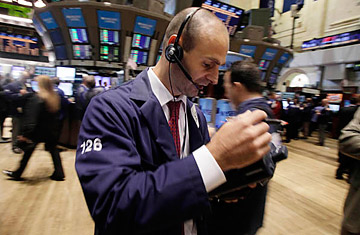
Traders work on the floor of the New York Stock Exchange Thursday, Aug. 18, 2011.
The Dow Jones industrial average was down 500 points in mid-morning trading, as investors once again have that "here we go again" feeling in the pit of their stomachs. So what's driving the stock market today?
Traders are already pointing to some larger, macro-economic issues, like contagion from the ailing Eurozone and a fear of a "false" market rally — that is, concern that recent mini-rallies have been mere pauses before even greater losses.
But there were also some specific issues weighing on investors' minds this morning — all of them negative.
1. The Philadelphia Fed Survey of U.S. manufacturing activity came in at negative 30.7, a huge slide from the expected reading of 1.0 (from analysts surveyed by Briefing.com). Last month the Philly Fed's survey reading clocked in at 3.2. That's a sign that one of the main U.S. economic engines is wheezing and hacking — and likely heading into a ditch.
2. Realtor.org is out with its July existing home sales numbers, and they're down again — with a caveat. Home sales declined from an estimated 4.87 million to 4.67 million for the month. That's down from the 4.84 million in June, although year-to-year, July was up over 2010. A weak housing market is strongly linked to weaker consumer sentiment. And if consumers aren't spending, businesses aren't making money.
3. Morgan Stanley says the U.S. and Europe are both "hovering dangerously close to recession, defined as two consecutive quarters of contraction — over the next 6-12 months." Economists and politicians had hoped to avoid the dreaded "R" word, but Morgan Stanley's statement this morning was the harshest reading of the economy all month. The Morgan report only adds to market anxiety, and an accompanying report from Deutsche Bank that cut China's gross domestic product estimate only threw more gasoline on the fire.
4. More Americans filed for unemployment benefits last week, according to the U.S. Labor Department. The data shows jobless claims rising by 9,000 — to 408,000 for the week. That's the highest figure in a month and a big red flag for the markets today. If U.S. companies resume laying off workers again, recession is likely the best case scenario — and traders know it. Fear of losing a job is one of the key drivers in consumer spending — and consumers account for about 70% of the U.S gross domestic product.
5. The U.S. Consumer Price Index rose 0.5% for July, with a 4.7% rise in gasoline prices really hitting Americans in the pocketbook. Factor in higher prices on things like food and gasoline to high unemployment and a low housing market picture, and you just about have a perfect economic storm — and a recipe for an ailing stock market.
It's not a pretty picture, on Wall Street or on Main Street. But at least we know why stocks are diving today.
